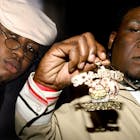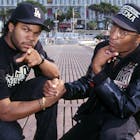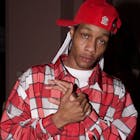MURS has spent the better part of 25 years doing shit his way.
The Mid-City product is one of the legends of the Los Angeles underground scene, having emerged as a teen in the 90s with 3 Melancholy, alongside high school friends Scarub and Eligh. He dropped his debut in 1997 and hasn't looked back; over the next quarter-century, MURS built a name for unfettered lyricism and a persona that could rest respectably alongside the most eclectic West Coast alt-rap and SoCal G tales. He's a child of Mid City, and his music is a reflection of how broad his neighborhood has always been.
To put it more succinctly; MURS is Los Angeles personified. There's everything from gang culture to car culture to skateboarding across The City of Angels and MURS breathes and reflects it all; the latter of which can be felt on songs like 2003's "Transitions Az A Ridah," from The End Of The Beginning—and prominently featured on Tony Hawk's Underground.
"When I was rapping about skateboarding, I didn't know there was a Tyler or Pharrell or a Lupe," he muses. "I dropped that in '03! I'd rock rollerblades and niggas from my neighborhood called me 'Tootie.'"
The jokes clung to MURS; he recollects one memory regarding the man MURS considers his biggest mentor, Walker Martin. MURS would meet superstars like Wu-Tang Clan and Mobb Deep through Martin, who owned Martin's Records. The music shop was a premiere location for Hip-Hop in Los Angeles.
"If you came to town, you fucked with Martin," MURS explains. "You didn't go to, like, the Warehouse. He'd have some barbecue or some bomb weed for you. When I got my deal at Warner Brothers, this white dude exec is like 'I hear you're from Mid City. You know Martin? He told me to tell you 'what's up, Tootie!'"
"I just signed a half million dollar deal!" he says, laughing. "And I'm still Tootie?"
Facts Of Life jokes aside, MURS had an unrelenting belief in himself and was never going to misrepresent for the sake of clout-chasing or fitting in with trends. That individualism and strong sense of self would propel his entire career. He reps for those who can't be or won't be boxed in.
"I was never not who I was," he says. "I came in with dreads and, of course, I used to ride rollerblades. But when you're not who you say you are—that's why I always told my story. It was important, because people back home were still rooting for me and watching for me. It would be disrespectful [to] them to not tell our stories through my eyes."









